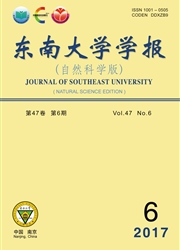

 中文摘要:
中文摘要:
为了提高行程时间预测的可靠性,构建了自回归综合移动平均与广义自回归条件异方差性(ARIMA-GARCH)模型进行城市主干道行程时间动态置信区间预测,其中ARIMA模型作为GARCH模型的均值方程用于捕获行程时间均值,GARCH模型用于捕获行程时间条件方差.运用昆山市交通监测系统中采集的实际交通流数据进行验证和评估.结果表明,相较于传统的ARIMA模型,提出的方法虽然不能显著提升行程时间均值的预测性能,但是在行程时间波动性预测方面具有较大的优势.该方法可捕获行程时间异方差,从而能够预测出比ARIMA模型预测的固定置信区间更能反映行程时间观测值波动性的动态置信区间.
 英文摘要:
英文摘要:
To improve the forecasting reliability of travel time, the time-varying confidence interval of travel time on arterials is forecasted using an autoregressive integrated moving average and generalized autoregressive conditional heteroskedasticity (ARIMA-GARCH) model. In which, the ARIMA model is used as the mean equation of the GARCH model to model the travel time levels and the GARCH model is used to model the conditional variances of travel time. The proposed method is validated and evaluated using actual traffic flow data collected from the traffic monitoring system of Kunshan city. The evaluation results show that, compared with the conventional ARIMA model, the proposed model cannot significantly improve the forecasting performance of travel time levels but has advantage in travel time volatility forecasting. The proposed model can well capture the travel time heteroskedasticity and forecast the time-varying confidence intervals of travel time which can better reflect the volatility of observed travel times than the fixed confidence interval provided by the ARIMA model.
 同期刊论文项目
同期刊论文项目
 同项目期刊论文
同项目期刊论文
 Reliable Short-Term Traffic Flow Forecasting for Urban Roads Multivariate Generalized Autoregressive
Reliable Short-Term Traffic Flow Forecasting for Urban Roads Multivariate Generalized Autoregressive Time-varying confidence interval forecasting of travel time for urban arterials using ARIMA-GARCH mo
Time-varying confidence interval forecasting of travel time for urban arterials using ARIMA-GARCH mo 期刊信息
期刊信息
